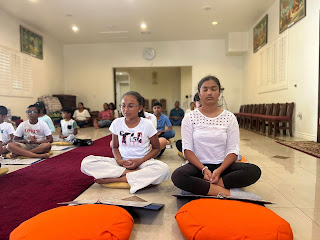MN 20: Vitakkasanthana Sutta:
The Relaxation of Thoughts
The Vitakkasanthana Sutta, as spoken by the Blessed One at Savatthi in Jeta's Grove, Anathapindika's monastery, outlines five methods to address and manage unwholesome thoughts. Here are the highlighted methods along with corresponding similes:Shifting Attention to Skillful Themes: If unskillful thoughts arise while focusing on a particular theme, the monk redirects attention to a skillful theme. This method is likened to a skilled carpenter using a small peg to dislodge a larger one.
Scrutinizing Drawbacks of Unwholesome Thoughts: When unskillful thoughts persist, the monk examines their drawbacks, acknowledging their unskillfulness, blame, and stressful nature. This method is likened to a person being horrified by an unsuitable adornment like a carcass hanging around their neck.
Paying No Mind to Unwholesome Thoughts: If unskillful thoughts continue, the monk disregards them entirely. This method is compared to someone consciously averting their eyes from undesirable sights.
Relaxing Thought-Fabrication: If unskillful thoughts persist, the monk attends to the relaxation of thought-fabrication regarding those thoughts. This process is compared to a person adjusting their physical posture from grosser to more refined positions.
Beating Down Unwholesome Thoughts: If unskillful thoughts still arise, the monk intensely and actively suppresses and restrains them with firm determination. This method is likened to a strong individual dominating and subduing a weaker person in a conflict.
The sutta emphasizes that a monk who masters these methods gains control over thought sequences, enabling the ability to think or not think specific thoughts at will. This mastery leads to the severance of craving, liberation from fetters, and the cessation of suffering and stress.

































0 comments:
Post a Comment
Your comments and feedback are very helpful to us in improving our posts. We really appreciate your time. Thank you!
Dhamma USA Team.